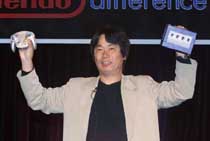Nintendo frowns on online
Lead designer Miyamoto's no fan of gaming via the Internet
March 6, 2002: 11:42 a.m. ET
|
 NEW YORK (CNNmoney) - There are a lot of big names in the gaming world betting heavily on online gaming. Nintendo's chief gaming architect is not one of them.
NEW YORK (CNNmoney) - There are a lot of big names in the gaming world betting heavily on online gaming. Nintendo's chief gaming architect is not one of them.
Although PC gamers - and a lot of PC game publishers - swear it's the future of the industry, and Microsoft and Sony insist (though not as adamantly as they used to) that it's part of the plan for their gaming consoles, Nintendo's Shigeru Miyamoto downplays the importance of gaming on the Internet.
"Online gaming, like using violence in games, is just one method of introducing gaming to the public," he said. "And there are other methods that can be used."
Miyamoto knows what he's talking about. Over the past 25 years, he's been responsible for creating some of the most successful titles in gaming history, including the Mario series, Donkey Kong and Legend of Zelda. He's a visionary in a $9 billion dollar industry whose opinions can play a large role in shaping the way things go - which makes his thoughts on this subject so unusual.
His problems with online gaming are multifold. First and foremost is the added expense - and hassle - for the player. While consoles allow a quick and easy way for someone to play video games, the addition of the Internet to the mix complicates matters considerably. All of a sudden, they're paying more than the $200 or $300 they paid for their system and the $50 or so they paid for the game. Additionally, they've got to worry about things like network outages and system lag.
| |

|
|
Loves games, but not online gaming. Nintendo's Miyamoto. | |
"There are a lot of people who are not set up to go online," he said. "I don't have faith that people will want to spend monthly fees to go online and play."
There's also the added question of how an online component helps the developer. While certain online-only PC titles (such as Sony's "Everquest") charge monthly fees to play, the majority offer free online multi-player action - which is the model the console market is most likely to follow.
"You have to ask who's making a profit there," he said. "You're going to have the Internet providers making money, maybe the people who make the hardware, but not the people who make the games."
Ultimately, though, it's the developer in Miyamoto that objects to online gaming. In order to make a title that is captivating to hundreds (or even dozens) of simultaneous players, the developer has to relinquish a lot of control. After all, player interaction is what online gaming is all about. In taking that step back, though, the developer can't dictate the course of the game, meaning it might not be true to their vision.
And that, said Miyamoto, is why you won't see him working on an online title anytime soon.
"Nintendo is not actively pursuing the idea of bringing games into an arena where Nintendo can not guarantee the quality of the game" he said. "We want the ideal gaming situation for everyone."
That's not to say the GameCube won't go online, though. The system was built with peripheral slots for regular modems and broadband connections. And the console will soon see the release of its first title with an Internet component. Third-party developer Sega will release "Phantasy Star Online" later this year.
Ultimately, Miyamoto says, the excitement over online gaming is really an excitement about communication. Playing a game with friends is more fun than sitting on your couch alone. And that, he said, is something the company has long been aware of.
"You can see that communication between players increases enjoyment of the game," he said. "But I think communication is a kind of fun that's not something the developer creates, but draws out. Online is not the only type of communication, but that's the one everyone has focused on - and I think that's sad."
Morris is director of content development for CNN/Money
Click here to send an email to Chris Morris 
|
| SPECIAL: |
|
|
|
|
|

|

